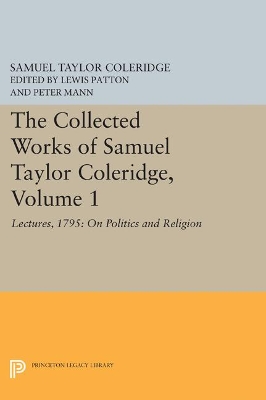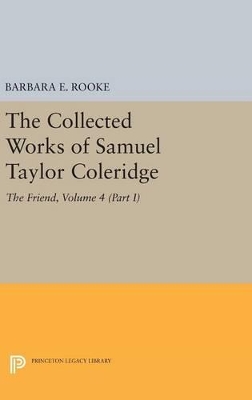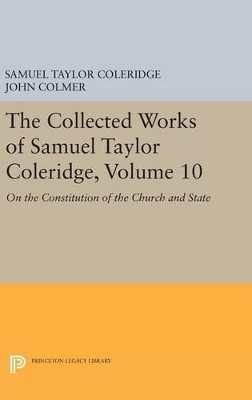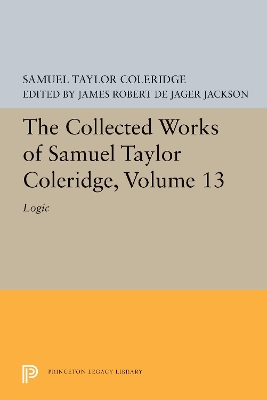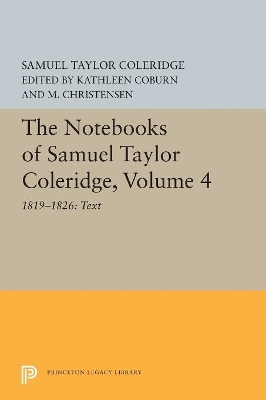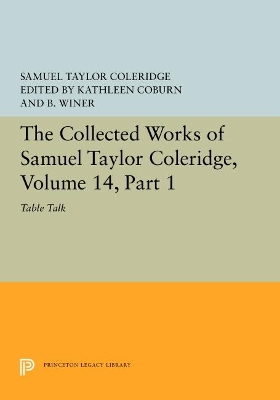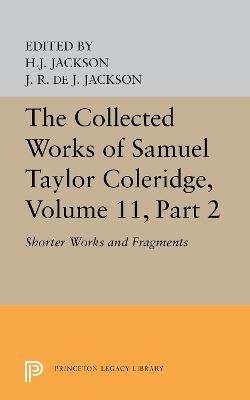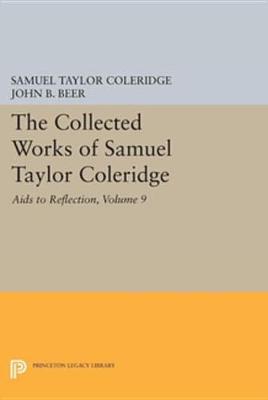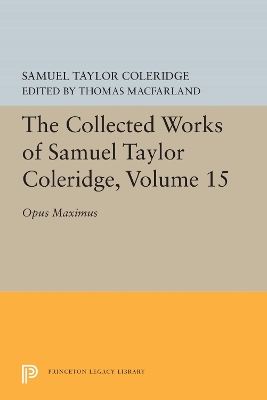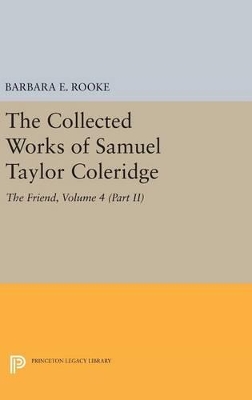Princeton Legacy Library
8 primary works • 11 total works
Book 1
The Collected Works of Samuel Taylor Coleridge, Volume 1
by Samuel Taylor Coleridge
Book 4
The Collected Works of Samuel Taylor Coleridge, Volume 4 (Part I)
by Samuel Taylor Coleridge
The goal of the Princeton Legacy Library is to vastly increase access to the rich scholarly heritage found in the thousands of books published by Princeton University Press since its founding in 1905.
Book 10
The Collected Works of Samuel Taylor Coleridge, Volume 10
by Samuel Taylor Coleridge
The goal of the Princeton Legacy Library is to vastly increase access to the rich scholarly heritage found in the thousands of books published by Princeton University Press since its founding in 1905.
Book 5573
The Collected Works of Samuel Taylor Coleridge, Volume 13
by Samuel Taylor Coleridge
The manuscript of Coleridge's Logic is published here in its entirety for the first time, along with the texts of manuscripts that are directly related to it.
Coleridge's plans to write about logic go back at least as far as 1803, but it was not until the 1820s that he undertook to write a book that would be of practical use to young men about to enter "the bar, the pulpit, and the senate." By that time the philosophy course he taught to classes of such young men had given them access to his thoughts, and he in turn benefited from their interest and enthusiasm. Coleridge wished to encourage his readers to think for themselves in a manner that was consistent and self-aware. He hoped to provide them with a system of logic "applied to the purposes of real life."
His Logic differs from earlier English models in its emphasis on the psychology of thought and in its sceptical treatment fo the figures of the syllogism. Here the influence of Kant's Critique of Pure Reason predominates. The Logic is also concerned with the psychology of language--indeed Coleridge thought of calling the book "The Elements of Discourse"--and with the philosophical and theological implications of different semantic theories. Here he was sustained by a vigorous English tradition and aided by his own subtle experience of the relationship between thoughts and words.
The Logic is an introduction to thinking about thought. It touches on a variety of topics--education, the origin of language, the importance of defining terms, subjective and objective truth, the meaning of abstraction, understadning and reason, conception and perception, self-consciousness, intuition, space and time, cause and effect, mathematical evidence, and the mind's emancipation from the senses--and behind these characteristic concerns Coleridge's more comprehensive views may be freshly glimpsed.
J.R. de J. Jackson is Professor of English at the University of Toronto. He is the author of Method and Imagination in Coleridge's Criticism and the editor of Coleridge: The Critical Heritage (both published by Routledge & Kegan Paul).
Bollingen Series LXXV
Originally published in 1981.
The Princeton Legacy Library uses the latest print-on-demand technology to again make available previously out-of-print books from the distinguished backlist of Princeton University Press. These editions preserve the original texts of these important books while presenting them in durable paperback and hardcover editions. The goal of the Princeton Legacy Library is to vastly increase access to the rich scholarly heritage found in the thousands of books published by Princeton University Press since its founding in 1905.
Book 5588
The Collected Works of Samuel Taylor Coleridge, Vol. 12, Part 4
by Samuel Taylor Coleridge
In his introduction to this edition of Coleridge's Marginalia, the late George Whalley wrote, "There is no body of marginalia--in English, or perhaps in any other language--comparable with Coleridge's in range and variety and in the sensitiveness, scope, and depth of his reaction to what he was reading." The edition of the Marginalia, of which this is the fourth volume, will bring together over eight thousand notes, many never before printed, varying from a single word to substantial essays. In alphabetical order of authors, the notes are presented literatim from the original manuscripts whenever the annotated volumes can be found. Each note is preceded by the passage of the original text that appears to have provoked Coleridge's comment. Texts in foreign languages are followed by translations.
The fourth volume of the Marginalia comprises annotations on almost one hundred books (from "Pamphlets" to Shakespeare), including well-known works by Pepys, Petrarch, Plato, Rabelais, and Ralegh. There are extensive notes on seven philosophical texts by Schelling and two by Schleiermacher, and also on plays by Shakespeare and novels by Walter Scott. The subjects addressed range from philosophy and literature through religion, politics, history, biography, and travel-writing to science and medicine.
Book 5609
The Notebooks of Samuel Taylor Coleridge, Volume 4
by Samuel Taylor Coleridge
During his adult life until his death in 1834, Coleridge made entries in more than sixty notebooks. Neither commonplace books nor diaries, but something of both, they contain notes on literary, theological, philosophical, scientific, social, and psychological matters, plans for and fragments of works, and many other items of great interest. This fourth double volume of the Notebooks covers the years 1819 through 1826. The range of Coleridge's reading, his endless questioning, and his recondite sources continue to fascinate the readers. Included here are drafts and full versions of the later poems. Many passages reflect the technological interests that led to Coleridge's writing of Aids of Reflection, later to become an important source for the Transcendentalists.
Another development in this volume is the startling expansion of Coleridge's interest in "the theory of life" and in chemistry--the laboratory chemistry of the Royal Institution of Great Britain and the theoretical chemistry of German transcendentalists such as Okea, Steffens, and Oersted. Also contained in this volume is an important section on the meaning of marriage.
Kathleen Coburn is Professor Emeritus at Victoria College of the University of Toronto. Merton Christensen was Professor of English at the University of Delaware.
Bollingen Series L:4.
Originally published in 1990.
The Princeton Legacy Library uses the latest print-on-demand technology to again make available previously out-of-print books from the distinguished backlist of Princeton University Press. These editions preserve the original texts of these important books while presenting them in durable paperback and hardcover editions. The goal of the Princeton Legacy Library is to vastly increase access to the rich scholarly heritage found in the thousands of books published by Princeton University Press since its founding in 1905.
Book 5627
The Collected Works of Samuel Taylor Coleridge, Volume 14
by Samuel Taylor Coleridge
Volume 1 of 2. Coleridge's nephew, son-in-law, and first editor, Henry Nelson Coleridge, began at the end of 1822 a record of Coleridge's remarks as a way of preparing an anthology of the interests and thought of the great poet and critic. His manuscripts, gathered to form the major text of his new edition, include passages on relatives, friends, and various censorable topics omitted from the Table Talk of 1835 and unpublished until now. These two volumes also contain talk recorded by other listeners from 1798 until Coleridge's death in 1834. Some of these records have not been previously published; some are published from manuscripts that differ from versions previously known. Also included are previously unpublished remarks by Wordsworth. Along with a bibliography of earlier editions of Table Talk and other useful appendixes, Carl Woodring's edition reprints the second edition (1836), which differs from the manuscripts more extensively than the edition of 1835.
THis is the first fully annotated edition of a work that long remained more popular in the United Kingdom than any of the works in prose published by Coleridge himself. The two volumes make a convenient encyclopedia of his ideas and interests.
Carl Woodring is George Edward Woodberry Professor of Literature Emeritus at Columbia University.
Originally published in 1990.
The Princeton Legacy Library uses the latest print-on-demand technology to again make available previously out-of-print books from the distinguished backlist of Princeton University Press. These editions preserve the original texts of these important books while presenting them in durable paperback and hardcover editions. The goal of the Princeton Legacy Library is to vastly increase access to the rich scholarly heritage found in the thousands of books published by Princeton University Press since its founding in 1905.
Book 5633
The Collected Works of Samuel Taylor Coleridge, Volume 11
by Samuel Taylor Coleridge
Volume 2 of 2. Coleridge's Shorter Works and Fragments brings together a number of substantial essays that were not long enough to require volumes to themselves, among them his "Theory of Life," "Essays on the Principles of Genial Criticism," "Treatise on Method," "Confessions of an Inquiring Spirit," "On the Passions," and "On the Prometheus of Aeschylus." To these are added more than four hundred other pieces, some of them fragementary, many of them previously unpublished, ranging in date from school essays of the early 1790s to a discussion of the bullion controversy in 1834. As might be expected, the subject matter includes literature and language, theology, philosophy, politics, and science, but in many less predicatble topics (such as child labor laws, marriage, suicide, church history, the abolition of slavery, the state of the colonies) also appear. By gathering this material and presenting it in chronological order, Shorter Works and Fragments reveals the development and major characteristics of Coleridge's seemingly inexhaustible variety.
H.J. Jackson and J.R. de J. Jackson, Professors of English at the University of Toronto, are the editors of Coleridge's Marginalia and Logic, respectively, in the Collected Works of Samuel Taylor Coleridge.
Bollingen Series LXXV
Originally published in 1995.
The Princeton Legacy Library uses the latest print-on-demand technology to again make available previously out-of-print books from the distinguished backlist of Princeton University Press. These editions preserve the original texts of these important books while presenting them in durable paperback and hardcover editions. The goal of the Princeton Legacy Library is to vastly increase access to the rich scholarly heritage found in the thousands of books published by Princeton University Press since its founding in 1905.
The Collected Works of Samuel Taylor Coleridge, Volume 9
by Samuel Taylor Coleridge
The Collected Works of Samuel Taylor Coleridge, Volume 15
by Samuel Taylor Coleridge
The Opus Maximum gathers the last major body of unpublished prose writings by Samuel Taylor Coleridge. Consisting primarily of fragments dictated to Joseph Henry Green, probably between 1819 and 1823, these writings represent all that exists of what Coleridge considered to be "the principal Labour" and "the great Object" of his life, which he called variously the Logosophia and Magnum Opus.
Dedicated to "the reconcilement of the moral faith with the Reason," Coleridge's envisioned Magnum Opus was supposed to "reduce all knowledges into harmony." While such a synthesis finally eluded him, and the Magnum Opus remained unfinished, the surviving fragments nonetheless bear powerful witness to Coleridge's engagement with theology, moral philosophy, natural philosophy, and logic, among other disciplines. Among the subjects that will particularly interest readers are Coleridge's criticisms of Epicureanism, pantheism, and German Naturphilosophie; his attempt to ground reason in faith; and his reflections on personhood (especially in the relationship between mother and child), on will, on language, and on the Logos.
Previously unknown to all but a handful of scholars, the manuscripts presented here provide valuable insight into a crucial period of Coleridge's intellectual development, as he became increasingly dissatisfied with Naturphilosophie and struggled to affirm Trinitarian Christianity on a rational basis. With this volume, The Collected Works of Samuel Taylor Coleridge, begun forty years ago under the sponsorship of the Bollingen Foundation and the editorship of the late Kathleen Coburn, is now complete.
The Collected Works of Samuel Taylor Coleridge, Volume 4 (Part II)
by Samuel Taylor Coleridge
The goal of the Princeton Legacy Library is to vastly increase access to the rich scholarly heritage found in the thousands of books published by Princeton University Press since its founding in 1905.
